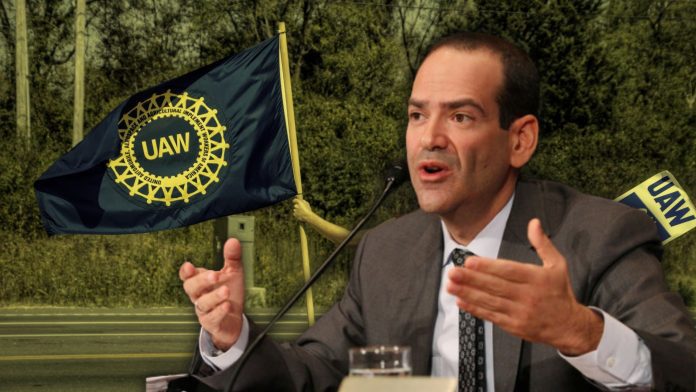According to a new report from the federal monitor overseeing the United Auto Workers (UAW) union, the union remains plagued by a culture of fear and retribution and has been slow to implement critical reforms.
The court-appointed monitor, Neil Barofsky, delivered his 10th status report after being assigned to oversee the UAW in 2020 as part of the union’s consent decree with the federal government. Barofsky argued that the UAW must take stronger measures to prevent corruption, criticizing the leadership under UAW President Shawn Fain for not responding promptly to document requests related to ongoing investigations into potential wrongdoing.
“When the monitorship began, the union had just concluded a period of its history characterized by a culture of fear and reprisal, in which UAW leaders actively undermined compliance controls to prevent financial malfeasance,” Barofsky wrote. He stressed that authorities had jailed several high-ranking officials for corruption, and a recent cultural evaluation exposed continuing issues of fear and retaliation among union employees.
Moreover, according to Barofsky, about 100 staffers had witnessed unethical behavior in the past year, but 30% of those did not report it. Around 40% of respondents expressed fears of retaliation if they reported misconduct.
Barofsky also pointed out that ongoing investigations were looking into Fain’s decision to reassign key assignments from two of his top lieutenants, who claimed it was retaliatory and further eroded union morale. Additionally, they cited Fain’s decision to reassign nine departments from the secretary-treasurer’s office to his own as a significant risk, potentially removing checks and balances on the president’s power. These actions included taking over the purchasing and information technology services departments and reassigning policy approval responsibilities from Secretary-Treasurer Margaret Mock to the compliance director within the president’s office.
Mock alleged that Fain retaliated against her by removing her responsibilities due to her refusal to approve certain expenditures she deemed improper. Barofsky emphasized that the UAW’s history and the persistent fear of retaliation necessitate caution in consolidating functions under the president’s office, as it could undermine employees’ willingness to report misconduct.
Despite these criticisms, Barofsky acknowledged that the UAW has made “tangible and significant improvements to its architecture of compliance,” including creating a compliance department and internal audit, along with other policies and procedures. However, he highlighted that the union has not finalized certain reforms regarding funding community and political activities, has inconsistently followed policies on conference-related expenditures, and struggled with procedures to prevent hiring unqualified personnel and combat perceptions of nepotism and favoritism.
These concerns are central to the monitor’s investigation into Fain’s actions, with Vice President Rich Boyer alleging that Fain sought benefits for his fiancée and her sister. Barofsky concluded that although the union has made commendable reforms, “there is still more work to do to fortify these areas.”



